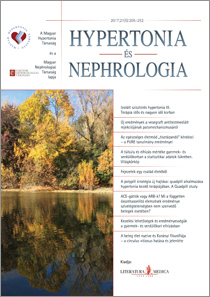The eLitMed.hu medical portal uses computer cookies for convenient operation. Detailed information can be found in the Cookie-policy.
Hypertension and nephrology - 2017;21(05)
Content
[Therapy of isolated systolic hypertension III.]
[In the elderly and very elderly (˃80 yrs), a wealth of data from large clinical trials are available, showing the necessity of treatment mostly with drug combinations - fix-combinations are preferred for increasing the adherence/persistence to therapy. Using diuretics, ACE-inhibitors/ARBs with calcium antagonists, and in special cases diuretics and beta blockers are also suggested by recent European guidelines (ESH, HSH). The target is <140 mmHg, but in octogenarians <150 mmHg. Some studies are pressing for even lower SBP (to around 120 mm Hg), but it seems to be wise to balance advantages/disadvantages, so the optimal SBP may be around 130 mmHg.]
[New results on the pathomechanism of antibody-mediated renal allograft rejection]
[Antibody mediated rejection (ABMR) is a severe clinical problem which is the major immunological cause of kidney transplant failure and may develop slowly months or years after transplantation. According to current knowledge, late ABMR is classically caused by the development of donor specific antibodies (DSA) and the complement system is believed to contribute to tissue damage. The detection of ABMR has been facilitated by improved techniques and new test, resulting in changes of the diagnostic criteria from time to time. The clinical interpretation of DSAs is still not clear however the complement binding ability could help to judge their relevance. In this review we discuss the new results on the pathomechanism and current diagnostic guideline of ABMR. Identification and treatment of ABMR before onset of clinical symptoms is still a big challenge but may lead to a significantly better outcome. In our study we are investigating the role of the complement system including quantitative and genetic testing of several complement proteins that can serve as a diagnostic/prognostic marker of the disease.]
[ACEi or ARB? What are the results of the comparative analysis?]
[Angiotensin-converting enzyme inhibitors (ACEis) and angiotensin receptor blockers (ARBs) are treatment options for patients with cardiovascular disease (CVD) or those with cardiovascular risk factors. The comparative efficacy and safety of ACEis and ARBs have been much debated. To compare the benefits of angiotensin-converting enzyme inhibitors (ACEis) and angiotensin receptor blockers (ARBs) in patients without heart failure a metaanalysis was carried out based on 254.301 subjects of 106 randomised trials. Meta-analysis included randomized trials of ACEis and ARBs compared with placebo or active controls and corroborated with head-to-head trials of ARBs vs ACEis. According to placebo controlled studies ACEis but not ARBs reduced all-cause mortality, cardiovascular mortality and MI. It seems that ACEis are more effective than ARBs. But this is only true if we take into account the trials before 2000. The analysis restricted to trials published after 2000 revealed similar outcomes with ACEis vs placebo and ARBs vs placebo. Head-to-head comparison trials of ARBs vs ACEis exhibited no difference in outcomes. The underlying causes and details are explained in this review.]
1.
Clinical Neuroscience
Is there any difference in mortality rates of atrial fibrillation detected before or after ischemic stroke?2.
Clinical Neuroscience
Factors influencing the level of stigma in Parkinson’s disease in western Turkey3.
Clinical Neuroscience
Neuropathic pain and mood disorders in earthquake survivors with peripheral nerve injuries4.
Journal of Nursing Theory and Practice
[Correlations of Sarcopenia, Frailty, Falls and Social Isolation – A Literature Review in the Light of Swedish Statistics]5.
Clinical Neuroscience
[Comparison of pain intensity measurements among patients with low-back pain]1.
Clinical Neuroscience Proceedings
[A Magyar Stroke Társaság XVIII. Kongresszusa és a Magyar Neuroszonológiai Társaság XV. Konferenciája. Absztraktfüzet]2.
3.
Journal of Nursing Theory and Practice
[A selection of the entries submitted to the literary contest "Honorable mission: the joys and challenges of our profession" ]4.
Journal of Nursing Theory and Practice
[End of Life and Palliative Care of Newborns in the Nursing Context]5.
Journal of Nursing Theory and Practice
[Aspects of Occupational Health Nursing for Incurable Patients ]




